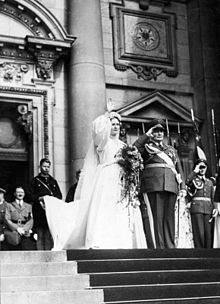Emmy Goering
Emmy Göring (born March 24, 1893 in Hamburg , † June 8, 1973 in Munich , born Emma Johanna Henny Sonnemann ) was a German actress and during the Nazi era the wife of Hermann Göring .
Life
Emmy grew up as the youngest of five children of a wealthy factory owner couple and enjoyed training as an actress with Leopold Jessner in Hamburg. From 1910 engagements followed in Hamburg , Munich , Vienna , Stuttgart and Weimar .
In 1916 she married her fellow actor Karl Köstlin , son of the director and dramaturge Theodor Köstlin ; the marriage was divorced in 1926. In 1932 she made the acquaintance of Hermann Göring, who was widowed in 1931 . In the function of the Prussian Prime Minister he awarded her the title of Prussian state actress in autumn 1934 and got her an engagement at the Prussian State Theater in Berlin . As Minna von Barnhelm , she said goodbye to the Berlin State Theater in 1935.
Marriage to Hermann Göring
The wedding of Hermann and Emmy Göring was celebrated with great pomp on April 10, 1935. The couple received the yacht Carin II belatedly as a gift from the German automotive industry in 1937 . The birth of their daughter Edda , who gave birth to Emmy Göring at the age of 45 on June 2, 1938, was staged for propaganda purposes. Emmy Göring and her husband led a pompous life in the style of an aristocratic family on the Carinhall estate in Schorfheide . When the opera singer Helene von Weinmann commented on her former colleague after the wedding with the words: “This show-off. I already knew her when she was not yet the High Lady and was available for 2.50 marks and a cup of coffee, ”she was mistreated, imprisoned and only released in 1943 seriously ill. Because Adolf Hitler was unmarried, Emmy Göring acted as the “High Woman” of the German Reich , often in competition with Magda Goebbels . Emmy Goering did not play a significant role in politics.
After the end of the war
After the end of the war, she and her daughter Edda were arrested by the Americans and in 1948 classified as an active National Socialist in front of the Garmisch-Partenkirchen Chamber and sentenced to 30% confiscation of property, a year in a labor camp and a five-year ban on performing. Former fellow actor Gustaf Gründgens also testified in her favor . During her time in various internment camps, Emmy suffered from sciatica and was almost constantly dependent on bed rest. In addition, she was constantly in trouble with the camp administration, as she kept putting up a picture of her husband. Hermann Goering committed suicide on October 15, 1946 - the night before his scheduled execution - suicide .
In 1958 she sold the holiday home in Wenningstedt on Sylt that she had built in 1935. She got the thatched roof house, which is under monument protection, back after the Second World War.
In 1967 she published the book At My Husband's Side . Quick magazine published parts of these memories in advance , making them accessible to a wide audience. There she transfigured her role at the side of Hermann Göring into the apolitical. The Wochenschauer , a weekly radio broadcast in the late 1960s, featured a satirical report on it with the refrain "Ich, Emmy Göring".
After a long illness, Emmy Göring died at the age of 80 in a Munich hospital. Her grave is in the Munich forest cemetery .
Filmography (selection)
- 1932: Goethe lives ...!
- 1934: Oberwachtmeister Schwenke in the role of Rena
- 1934: Wilhelm Tell - The freedom drama of a people in the role of Hedwig Tell
literature
- Anna Maria Sigmund : The women of the Nazis. Wilhelm Heyne Verlag, 7th edition, Munich 2000.
- Emmy Goering: At my husband's side. Nation Europa Verlag, Coburg 2007, ISBN 978-3-920677-67-5 .
- Klaus Mann caricatured her in 1936 in his novel Mephisto in the role of Lotte Lindenthal.
- Werner Fritsch : Enigma Emmy Göring (monologue), Frankfurt / Main, Suhrkamp 2007 ISBN 978-3-518-41951-9 .
Web links
- Emmy Goering in the Internet Movie Database (English)
- Literature by and about Emmy Göring in the catalog of the German National Library
- Pictures by Emmy Göring In: Virtual History
Individual evidence
- ↑ Emmy Göring - The First Lady of the Nazis. Documentary by Annette Baumeister (broadcast on MDR on August 16, 2015).
- ↑ Volker Knopf, Stefan Martens: Görings Reich: Self-productions in Carinhall. 4. update Edition. Berlin 2007, p. 152.
- ↑ Ralf Henningsen: In the Sylt dunes: Former Hermann Göring house is for sale | shz.de. Retrieved November 20, 2019 .
- ↑ suhrkamp.de : Werner Fritsch: Enigma Emmy Göring
| personal data | |
|---|---|
| SURNAME | Goering, Emmy |
| ALTERNATIVE NAMES | Sonnemann, Emma Johanna Henny (maiden name) |
| BRIEF DESCRIPTION | German actress and the second wife of Hermann Göring |
| DATE OF BIRTH | March 24, 1893 |
| PLACE OF BIRTH | Hamburg |
| DATE OF DEATH | June 8, 1973 |
| Place of death | Munich |

